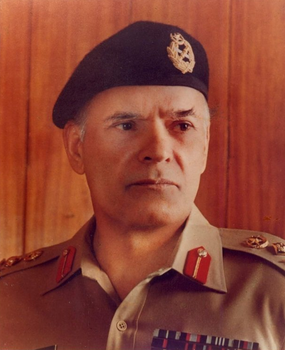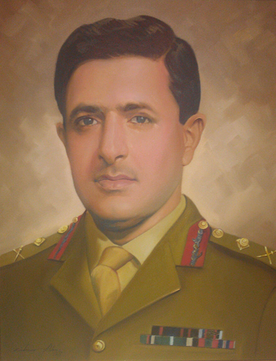
Muhammad Zia-ul-Haq was a Pakistani military officer who served as the 6th president of Pakistan from 1978 until his death in 1988. He rose to prominence after leading a coup on 5 July 1977, which overthrew the democratically elected government of prime minister Zulfikar Ali Bhutto. Zia subsequently imposed martial law, suspended the constitution, and served as chief martial law administrator before assuming the presidency. Zia served as the 2nd chief of the Army Staff from 1976 to 1988, a position he later leveraged to execute a coup in 1977, which was the second coup in Pakistan's history of coups; the first occurred in 1958 under Ayub Khan.

The Rawalpindi conspiracy was an attempted coup to overthrow Liaquat Ali Khan, the first prime minister of Pakistan, in March 1951. It was the first of many subsequent coup attempts against governments in the history of Pakistan. The coup was notably planned by military general Akbar Khan, poet Faiz Ahmad Faiz and writer Sajjad Zaheer along with 12 others.

The Inter-Services Intelligence is the premier intelligence agency of Pakistan. It is responsible for gathering, processing, and analyzing any information from around the world that is deemed relevant to Pakistan's national security. The ISI reports to its director-general and is primarily focused on providing intelligence to the government of Pakistan.

Tehreek-e-Jafaria Pakistan, formerly Tehreek Nifaz Fiqah-e-Jafaria Arif Hussaini/Sajid Naqvi Group was the Shia political party in Pakistan from 1979 to 2000. Belonging to the Ja'fari school of Islamic jurisprudence, TNFJ was founded in 1979 by Allama Syed Arif Hussain Al Hussaini supported by Grand Ayatollah Muhammad Hussain Najafi Dhaku. Its creation coincided with the enforcement of controversial Islamic laws by then President of Pakistan, General Mohammad Zia-ul-Haq. At the same time, 1979 Iranian Revolution in Shi'a Iran added extra confidence and comfort in the movement.

Akhtar Abdur Rahman was a Pakistan Army general who served as the 5th Chairman Joint Chiefs of Staff Committee from 1987 until his death in 1988. He previously served as the 12th Director-General of Inter-Services Intelligence from 1979 to 1987. During both Indo Pak wars of 1965 and 1971, he oversaw action with his own unit 45 Field Regiment Artillery in Sundra and Hussainiwala sectors respectively.
al-Zulfikar was a far-left terrorist faction formed in 1979 by Pakistani politician Murtaza Bhutto. Named after his father and former Pakistani prime minister Zulfikar Ali Bhutto, the group opposed the government of military dictator Muhammad Zia-ul-Haq, who had deposed Zulfikar in 1977 and installed himself as the president of Pakistan.

Zahirul Islam Abbasi was a major general of the Pakistan Army. Serving in the Siachen region of the disputed territory of Kashmir, Abbasi planned and executed assaults on Indian Army posts. Abbasi was sentenced to 7 years imprisonment for being party to an attempted coup d'état against the civilian government of Benazir Bhutto in 1995 while he was still a serving major general. No political party was linked to this coup attempt as determined by the courts.
The Pakistan coup attempt of 1995 or Operation Khalifa was a secretive plot hatched by renegade military officers and against the government of Benazir Bhutto, the prime minister of Pakistan. The plotters aimed to overthrow the constitutional government and establish military rule in Pakistan. The plot was foiled after intelligence agencies tipped off the Pakistan Army. Despite the failure, the coup attempt would weaken Bhutto's government considerably in the aftermath.
Ali Kuli Khan KhattakHI(M) is a Pakistani retired three-star general and former field commander of X Corps.
General Sawar KhanNI(M) HI(M) SBt was a four-star general of the Pakistan Army who was the Governor of the largest province, Punjab and the Vice Chief of Army Staff during the era of General Muhammad Zia-ul-Haq, when Zia was simultaneously the Chief of Army Staff (Pakistan) and the President of Pakistan.
Chaudhry Zahoor Elahi was a Pakistani politician from the town of Gujrat, Punjab, British India.
The political history of Pakistan is the narrative and analysis of political events, ideas, movements, and leaders of Pakistan. Pakistan gained independence from the United Kingdom on 14 August 1947, when the Presidencies and provinces of British India were divided by the United Kingdom, in a region which is commonly referred to as the Indian subcontinent. Since its independence, Pakistan has had a colorful yet turbulent political history at times, often characterized by martial law and inefficient leadership.

General Zia-ul-Haq, the sixth president of Pakistan, died in an aircraft crash on 17 August 1988 in Bahawalpur near the Sutlej River. Zia's close confidant CJCSC Akhtar Abdur Rahman, 8th Director-General of the ISPR Siddique Salik, American diplomat Arnold Lewis Raphel and 26 others also died upon impact.

Tajammul Hussain Malik was a senior officer in the Pakistan Army and the former General Officer Commanding of the 23rd Division of Pakistan Army, retiring with the rank of major general. He was the commanding officer of Pakistani forces at the Battle of Hilli during the Indo-Pakistani war of 1971, and headed a failed coup attempt against the regime of Zia-ul-Haq in 1980 which resulted in a court-martial held by Judge Advocate General Branch of Pakistan Armed Forces headed by General Zia-ul-Haq.
The 1977 Pakistani military coup was the second military coup in the history of Pakistan. Taking place on 5 July 1977, it was carried out by Muhammad Zia-ul-Haq, the chief of army staff, overthrowing the government of Prime Minister Zulfikar Ali Bhutto.

Military coups in Pakistan began in 1958 when military officer Muhammad Ayub Khan overthrew and exiled president Iskandar Ali Mirza. Since its creation in 1947, Pakistan has spent several decades under military rule. After their respective terms in office, each of the past five prime ministers of Pakistan has faced convictions or imprisonment. This trend highlights a significant aspect of Pakistan's political landscape: the prevailing rule that the Pakistani military exercises influence wherever it deems necessary, often persisting despite potential repercussions. Throughout Pakistani history, the military has played a prominent role in governance, with periods where it has directly ruled the country.

Muhammad Zia-ul-Haq's dictatorship after assuming the position of sixth president of Pakistan began on 16 September 1978 and ended with his death in an aircraft crash on 17 August 1988. Zia came to power after a coup, overthrowing prime minister Zulfikar Ali Bhutto and imposing martial law in 1977.
Central Jail Rawalpindi is a prison located in Rawalpindi, Pakistan.
Ghulam Jilani KhanHI(M) SBt was a senior general of the Pakistan Army who served as the 14th Governor of Punjab Province and 11th Defence Secretary of Pakistan in the military government of President General Zia-ul-Haq.
In 1984, Zia ul Haq regime faced another attempt of coup d'état just four years after the 1980 attempt. This time the coup attempt came from leftists who wanted to overthrow Zia and establish a populist military regime in the country. The attempt was foiled by Inter Services Intelligence and all the plotters were arrested.









